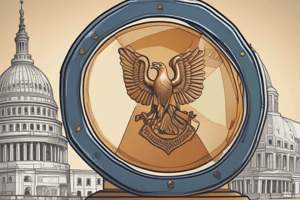Podcast
Questions and Answers
Someone who lobbies on behalf of a company that he or she works for as part of his or her job is _____
Someone who lobbies on behalf of a company that he or she works for as part of his or her job is _____
an in-house lobbyist
Why might several competing corporations join together in an association?
Why might several competing corporations join together in an association?
because there is often strength in numbers, they often have common issues that may affect an entire industry, and they can all benefit from governmental policies
What type of incentives appeal to someone's concern about a cause?
What type of incentives appeal to someone's concern about a cause?
purposive incentives
What are some ways to overcome collective action problems?
What are some ways to overcome collective action problems?
What changes have occurred in the lobbying environment over the past three or four decades?
What changes have occurred in the lobbying environment over the past three or four decades?
What does group participation provide to citizens?
What does group participation provide to citizens?
What are some barriers to participation?
What are some barriers to participation?
What is a difference between a PAC and a super PAC?
What is a difference between a PAC and a super PAC?
How do interest groups and their lobbyists decide which lawmakers to lobby?
How do interest groups and their lobbyists decide which lawmakers to lobby?
In what ways are lobbyists regulated?
In what ways are lobbyists regulated?
How are collective goods different from private goods?
How are collective goods different from private goods?
Flashcards are hidden until you start studying
Study Notes
In-House Lobbyists
- An in-house lobbyist represents a company as part of their job responsibilities, advocating for the organization's interests.
Collective Action in Corporations
- Competing corporations often form associations to leverage collective strength.
- Common industry issues may prompt collaboration among corporations.
- Joint efforts can lead to mutual benefits through favorable government policies.
Purposive Incentives
- Purposive incentives appeal to individuals by aligning with their values and concerns about a cause.
Overcoming Collective Action Problems
- Material, solidary, and purposive benefits are incentives offered by group leaders to engage members.
- Political, economic, or social disturbances can mobilize groups and facilitate collective action.
Changes in Lobbying Environment
- Professional lobbying has increased over recent decades.
- Interest groups now lobby both national and state governments.
- Fragmentation of interests has broadened the range of lobbying efforts.
Group Participation Benefits
- Membership in interest groups enables deeper civic engagement beyond voting.
- Individuals can connect with like-minded people, engage in community activities, and raise awareness about issues.
Barriers to Participation
- Lack of time and resources can hinder political participation.
- Lower-income individuals may struggle with necessary civic skills.
- Institutional barriers, such as strict voter ID laws, disproportionately affect specific groups.
PACs vs. Super PACs
- PACs (Political Action Committees) are preferred by conservative interests compared to super PACs, which have fewer restrictions on donations.
Lobbying Strategies
- Interest groups gain access to lawmakers by supporting candidates during campaigns, especially prioritizing incumbents.
- After election, lobbyists encourage lawmakers to introduce desirable legislation, targeting sympathetic and influential legislators.
Lobbyist Regulations
- Lobbyists face prohibitions on certain activities and are required to disclose contributions.
- There are restrictions on lobbying activities for individuals immediately after leaving a government office.
Collective vs. Private Goods
- Collective goods provide wide-ranging benefits to the public, while private goods deliver specific advantages to individuals or groups.
Studying That Suits You
Use AI to generate personalized quizzes and flashcards to suit your learning preferences.




